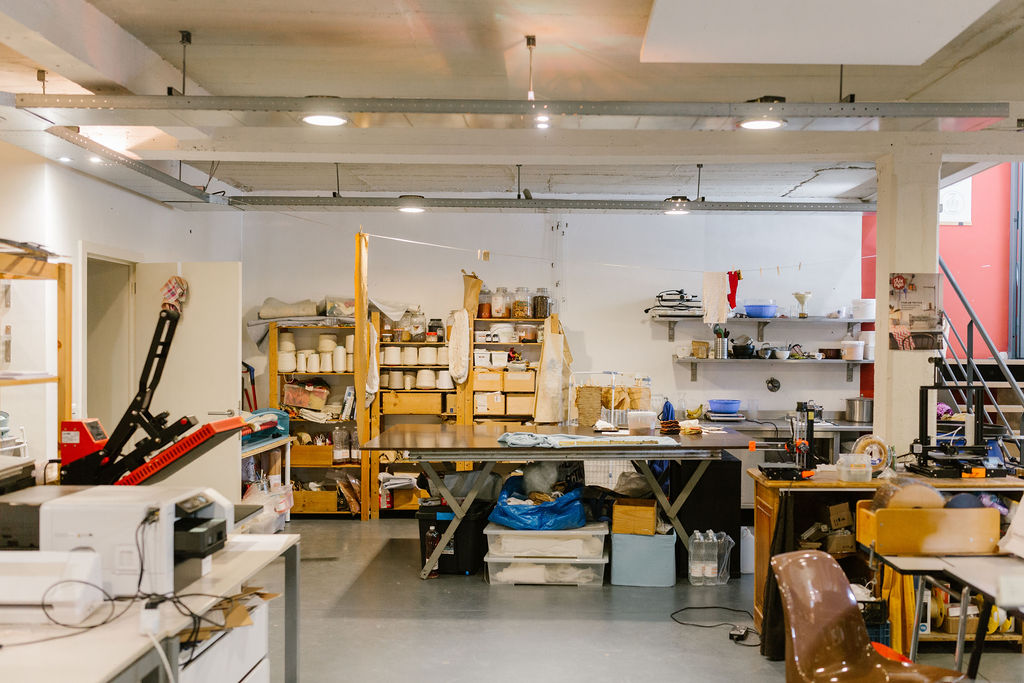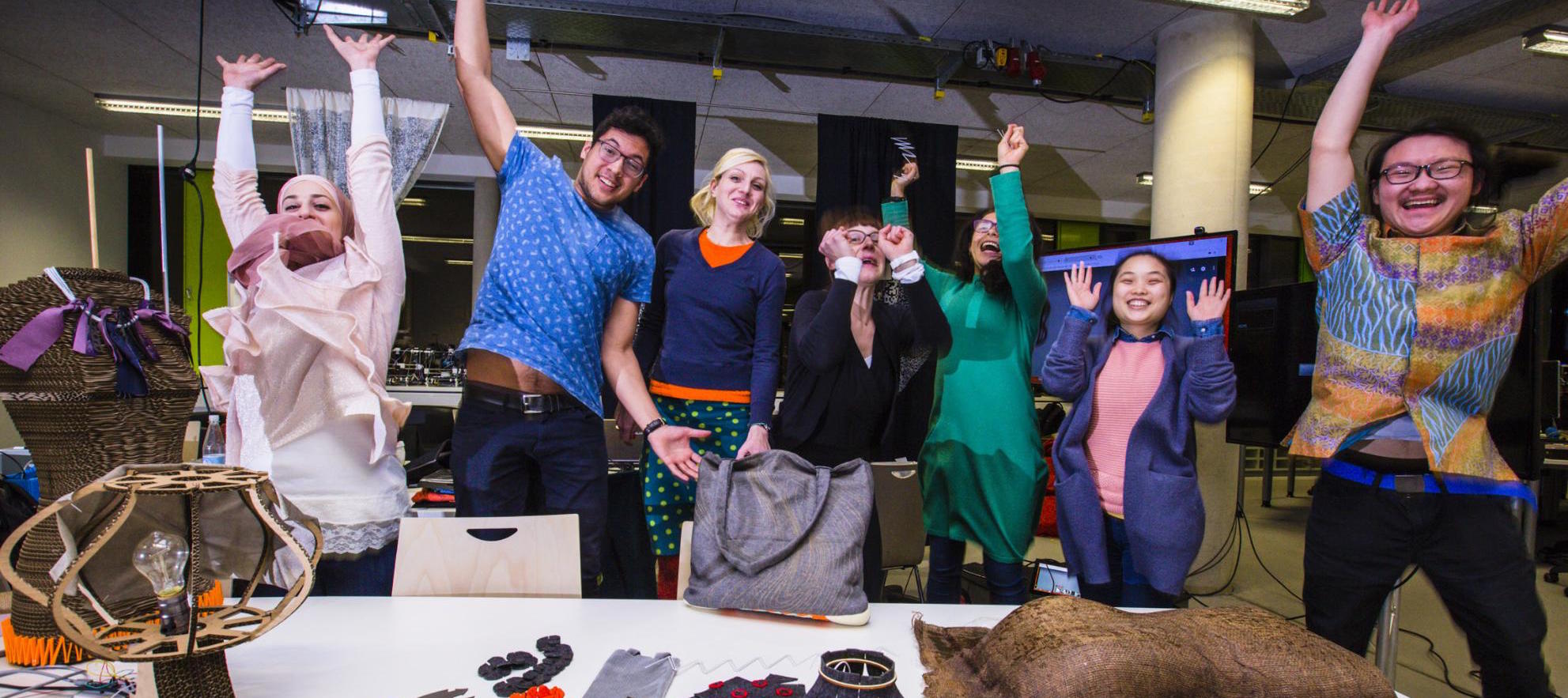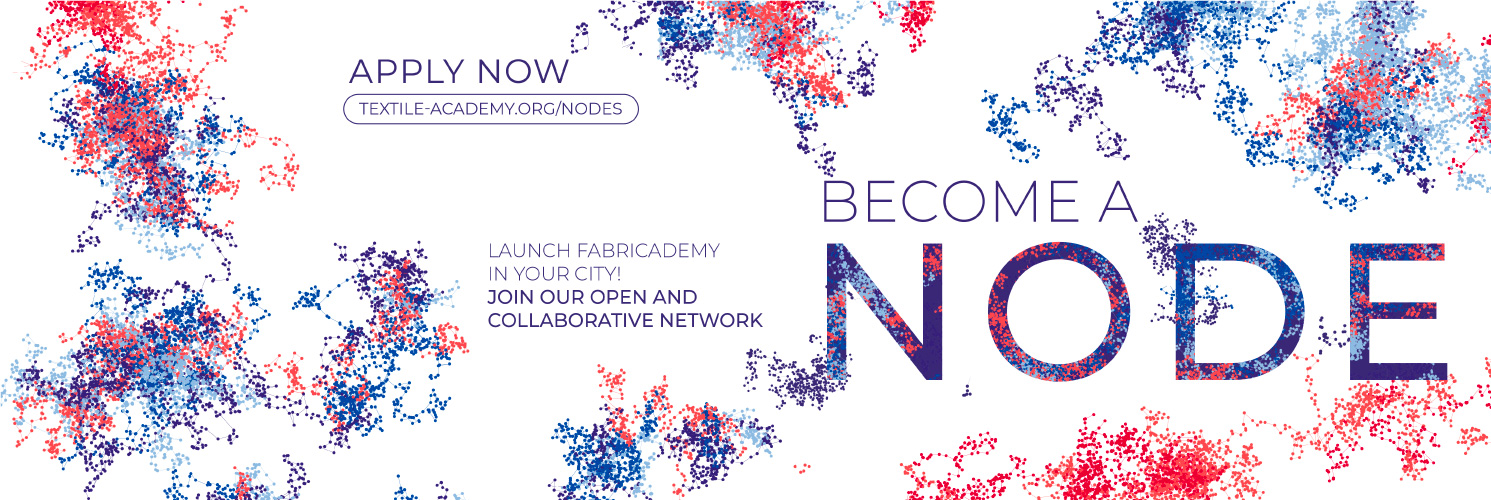Becoming a Fabricademy Node
Hosting Fabricademy is open to different kinds of institutions like Fab Labs, textile co-working spaces, textile research centers, creative spaces, fashion and design schools, artist studios.
While some Fab Lab equipment is necessary to complete the course, we encourage establishing collaboration with other stakeholders to combine infrastructures or partnering with your closest Fab Lab.
If you are currently in the process of setting up Node thanks to funding you can directly contact us at coordination@textile-academy.org and we can guide you through with process.
The key inventory required for the places that are willing to offer the program are highlighted below.

In the picture our Node Green Fabric - Brussels
Basic Requirements
- ⚙️ Machines / Fab Lab Equipment
- 🧵 Textile Fabrication lab
- 🧫 DIY Bio Lab

An ideal number of students is 5 per year, but you can start getting the training as well to become instructor as a "single node".
In case of no local instructor, a remote instructor, part of fabricademy global team is assigned to mentor, evaluate and guide the Node participants.
A Fabacademy alumni can also become a local instructor by attending one of our intensive bootcamps. We offer training for instructors in the form of Bootcamps before the course as well as online open-access materials for getting prepared.
We have a list of all possible inventory required for setting up a Node from zero and separate tab explaining the consumables required for each module at our inventory. For the most up-to-date list of recommended machines and supplies, see: the Fabricademy Lab Inventory.
2024/25 Nodes
Asia
SkyLab Workshop, Kamakura, Japan
Contact: Rico Kantatham
Somaiya School of Design (SSD)
Mumbai, India
Europe
Fab Lab Armenia, Dilijan
Contact: Babken Chugaszyan
Artilect Fab Lab, Toulouse, France
Contact: Nicolas Lassabe
Green Fabric, Bruxelles, Belgium
Contacts: Valentine Fruchart
Basque Bio Design Center, Bilbao, Spain
Contact: Zana Bosnic & Eduardo Loreto
Fab Lab Leon, Spain
Contact: Nuria Robles
Iaac, Fab Lab Barcelona, Spain
Fab Lab Barcelona / Institute for Advanced
Architecture of Catalonia
Contact: Santi Fuentimilla
TextileLab Amsterdam, The Netherlands
Fab Lab Amsterdam / Waag Society
Contact: Cecilia Raspanti
OpenDot, Milan, Italy
Contact: Emma Pareschi
North & Central America
Fab Lab Yucatan, Mexico
Contact: Ileana Ceron Palma
Ibero IDIT Fab Lab Puebla, Mexico
Contact: Aristarco Cortés
South America
Fab Lab Esan, Lima, Peru
Contact: Jorge Valerio
Middle East
CPF Makerspace (Techworks), Amman, Jordan
Contact: Ismail Hakki
Africa
Fab Lab Rwanda
Contact: Bizimana Danny
Lab Equipment
Fabricademy's inventory is an extension to the fab lab inventory with textile equipment and a DIY Bio Lab.⚙️ Setting up a Fab Lab
- 3D Printer FDM
- Laser cutter Co2
- CNC Milling Machine
- Vinyl cutter
- Molding, casting, composites
- Soldering station / electronics workbenches and materials
- Big screen (a big screen is preferred to a projector)
- Good internet connection > For more information about how to set up a Fab Lab you can refer to FabFoundation's website.
🧵 Setting up a Textile Lab
If you are already a Fab Lab or collaborate with a local makerspace or co-working with this equipment there are few machines and equipment necessary to run the program.- Sewing machine industrial normal / (second hand/optional)
- Sewing machine industrial overlock / (second hand/optional)
- Digital desktop Sewing machine / it can be versatile and combine digital embroidery
- Knitting machine / optional
- Weaving machine / optional
- Tufting workshop / optional
- Heat press
- Soft actuators / e-textiles (conductive threads, conductive fabrics, mini vibration motors…)
- Scissors, threads, yarns, natural and synthetic textiles
- Big working tables (as fashion schools)
- Roland Tex-art dye sublimation printer / optional
🧫 Setting up a DIY Bio Lab
In our inventory you can find basic equipment to set up a DIY Bio Lab- Kitchen tools, incubator, petri dishes etc..
- Grow tent, smart citizen etc..

